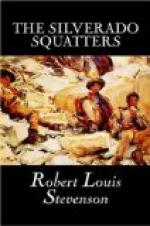Indeed, it would be hard to exaggerate the pleasure that we took in the approach of evening. Our day was not very long, but it was very tiring. To trip along unsteady planks or wade among shifting stones, to go to and fro for water, to clamber down the glen to the Toll House after meat and letters, to cook, to make fires and beds, were all exhausting to the body. Life out of doors, besides, under the fierce eye of day, draws largely on the animal spirits. There are certain hours in the afternoon when a man, unless he is in strong health or enjoys a vacant mind, would rather creep into a cool corner of a house and sit upon the chairs of civilization. About that time, the sharp stones, the planks, the upturned boxes of Silverado, began to grow irksome to my body; I set out on that hopeless, never-ending quest for a more comfortable posture; I would be fevered and weary of the staring sun; and just then he would begin courteously to withdraw his countenance, the shadows lengthened, the aromatic airs awoke, and an indescribable but happy change announced the coming of the night.
The hours of evening, when we were once curtained in the friendly dark, sped lightly. Even as with the crickets, night brought to us a certain spirit of rejoicing. It was good to taste the air; good to mark the dawning of the stars, as they increased their glittering company; good, too, to gather stones, and send them crashing down the chute, a wave of light. It seemed, in some way, the reward and the fulfilment of the day. So it is when men dwell in the open air; it is one of the simple pleasures that we lose by living cribbed and covered in a house, that, though the coming of the day is still the most inspiriting, yet day’s departure, also, and the return of night refresh, renew, and quiet us; and in the pastures of the dusk we stand, like cattle, exulting in the absence of the load.
Our nights wore never cold, and they were always still, but for one remarkable exception. Regularly, about nine o’clock, a warm wind sprang up, and blew for ten minutes, or maybe a quarter of an hour, right down the canyon, fanning it well out, airing it as a mother airs the night nursery before the children sleep. As far as I could judge, in the clear darkness of the night, this wind was purely local: perhaps dependant on the configuration of the glen. At least, it was very welcome to the hot and weary squatters; and if we were not abed already, the springing up of this lilliputian valley-wind would often be our signal to retire.
I was the last to go to bed, as I was still the first to rise. Many a night I have strolled about the platform, taking a bath of darkness before I slept. The rest would be in bed, and even from the forge I could hear them talking together from bunk to bunk. A single candle in the neck of a pint bottle was their only illumination; and yet the old cracked house seemed literally bursting with the light. It




